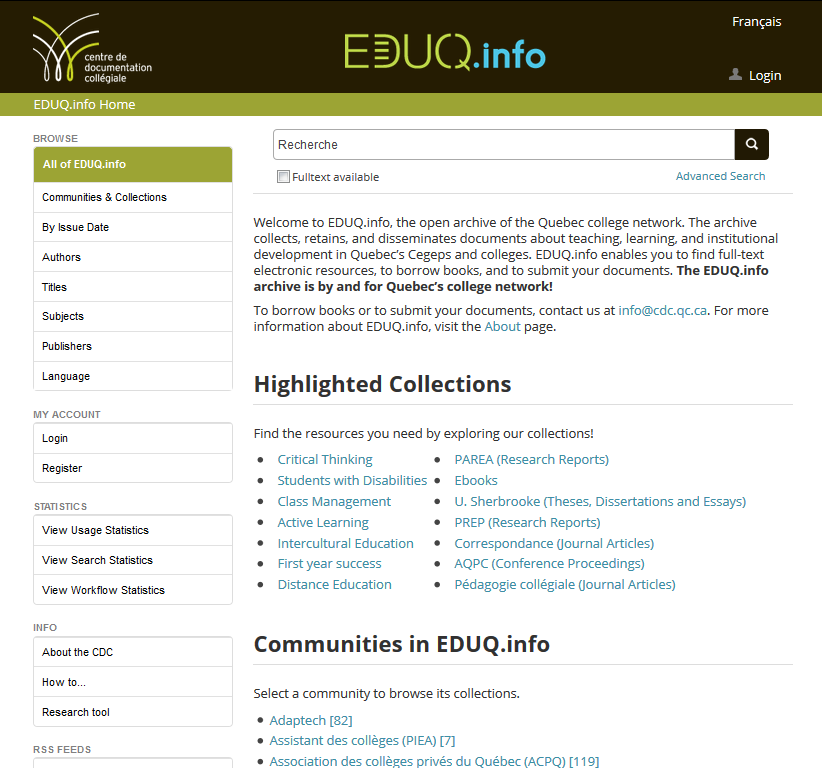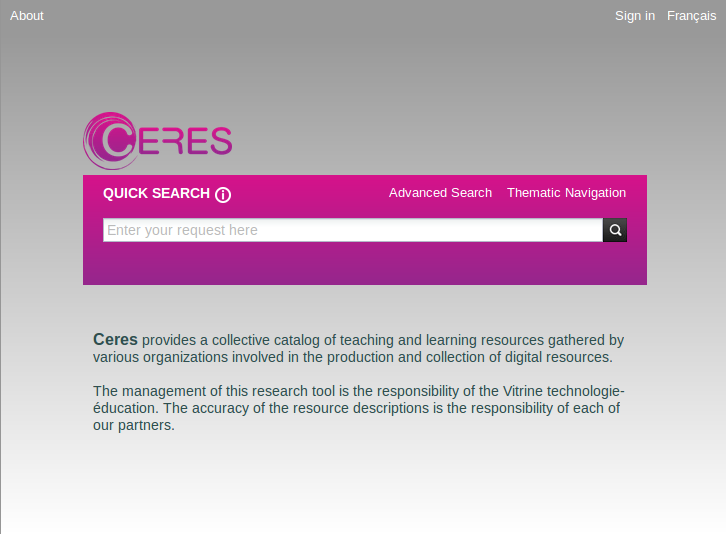Beginning a Blended Learning Approach with EDUQ.info and Ceres
With all the buzz around developing a digital strategy for education in Quebec’s college network, this year many teachers will be looking into how a blended learning approach might contribute to developing their students’ competencies.
Profweb continues to share inspiring stories of teachers that are taking first steps in blended learning. But you may ask yourself, how do I take the next step? As responsible educators, we want to make sure that whatever approach we adopt is pedagogically sound. There are 2 excellent tools that work in tandem to facilitate your research and reflection: EDUQ.info and Ceres.
A Virtual Documentary Research Tool to Facilitate Your Reflection
Getting started with a blended learning approach may require some up-front research for those who want to develop a solid strategy for their courses. Luckily, there is an organization that can assist teachers with thematic documentary searches. The CDC (Centre de documentation collégiale) is a ministerial IT partner that has deployed an open archive called EDUQ.info.
According to its website, the EDUQ archive “collects, retains, and disseminates documents about teaching, learning, and institutional development in Quebec’s Cegeps and colleges.” The archive includes over 35 000 documents related to the college system in Quebec spanning the introduction of CEGEPs up until now.

The home page of EDUQ.info that shows its search box and some highlighted collections of resources.
In the EDUQ.info catalogue, you will find:
- Research reports
- Scientific journal articles
- Thesis papers
- White papers and essays
Teachers that wish to explore the effectiveness of blended learning or receive general information about the approach can simply enter ‘blended learning’ in the search window that appears on the EDUQ website. The search returns several documentary sources, such as PDFs that you can download, or e-books which require you to register in order to be able to download. Educational stakeholders are entitled to a free membership and signing up is very simple.
To personalize your research even further, a professional team of librarians at the CDC is available to assist you. I have to admit that I am still fond of reading from books and sometimes prefer longer reads in print over digital documentation. If you find yourself in the same category as me, you will be pleased to learn that the CDC also mails print-based documents from their collection at no extra charge to you!
A Database of International Teaching and Learning Resources Relevant to College-level Instruction
Once you have read and reflected upon the approach you would like to adopt, you will want to get started designing your teaching or learning resource. Might I suggest that you first have a look at the Ceres database?
Ceres, which is maintained by ministerial IT partner VTÉ (Vitrine technologie-éducation), catalogues digital teaching and learning objects that can be used directly in your blended approach to teaching.
On Ceres you can find links to:
- Simulations
- Competency-specific training videos
- Lesson plans
A number of the resources that are referred to in Ceres are Open Educational Resources that you can reuse or adapt for your specific use, depending on the type of licence the content author has chosen for their resource. All of the resources are referenced using metadata that takes into account the different ministerial discipline codes, which facilitates finding resources that are specific to what you are teaching. Rather than reinventing the wheel, why not see if there are existing open educational resources, like a simulation or lesson plan that you can adapt for your purposes, saving precious time and effort?

The ‘Quick Search’ interface of the Ceres catalogue. Note that discipline-based searches are available in the ‘Thematic Navigation’ window.
The Ceres site is based on international standards for information infrastructure. Ceres is a platform that can interface with other international academic organization catalogues of digital teaching and learning resources, and resources are also categorized by the Dewey system, should you prefer to search along these lines. The magic of Ceres is that all of the complexities of educational taxonomies, metadata and programming that are part of this service are at your command with a simple search field. It’s very powerful!
Designing, Teaching and Exploring
With your documentary search on EDUQ.info and your exploration of learning objects on Ceres behind you, it is now time to get down to designing your teaching and learning resource. Perhaps you would like to create your first narrated video screencast using PowerPoint or other open source tools. There are many options available to you.
Go ahead and try a few things out! If you want more information about designing online learning like a pro, there is a great resource from a United Nations agency which I highly recommend you read. It’s available here. You can also search the archive on Profweb for inspiring stories of teachers that are trying flipped classroom pedagogy or blended learning.
Sharing Through Complementary Platforms
Now that you have implemented a new approach and perhaps even created a new resource, it’s time to consider whether other educators in the college network and beyond might benefit from what you have created.
- If you have created a teaching or learning resource, why not have it catalogued in Ceres?
- Have you authored a report, journal article or more substantial publication on your blended learning experience? Why not add your documentary resource to the rich heritage of college documentation that has been catalogued within EDUQ.info?
An incredible amount of time and effort has been invested by the CDC and the VTE to facilitate teacher access to documentary and educational resources and respecting international standards. Both organizations have an editorial policy for their platforms which helps to ensure a high level of relevance for the resources within their respective catalogues. We are very fortunate to have these 2 organizations leading the charge to provide platforms for sharing and advancing educational approaches in the digital era.
Both the CDC and the VTE would be pleased to assist you in your search or to integrate resources you have developed into their collections so that the world can benefit from your contribution! And as always, we would be happy to share your tips and inspire other teachers in the network by publishing the story of your experience on Profweb!
Best wishes for your exploration and experimentation!

